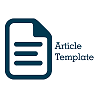ELT TEXTBOOK PROS AND CONS IN EFL ENVIRONMENT: HOW TEACHERS SHOULD MAKE A DECISION
(1) Universiti Pendidikan Sultan Idris Malaysia; Universitas Islam Kalimantan MAAB
(2) Universitas Islam Kalimantan MAAB
(3) UIN Antasari Banjarmasin
(*) Corresponding Author
Abstract
Keywords
Full Text:
PDF (Bahasa Indonesia)References
AbdelWahab, M.M (2013). Developing an English Language Textbook Evaluative Checklist.
ISQR- JRME. 3 (Mar-Apr. 2013)
Ahour, T. & Ahmadi, Ezatollah. (2012). Retrospective Evaluation of Textbook “Submit 2B” for its Suitability for EFL Undergraduate Students. Journal of Educational and Social Research. Vol.2 (5) March 2012.
Alibakhshi, G. (2007). On the Importance of Material Adaptation in EFL Classroom. FLT, 82 (21), 23-29
Allwright, R. L. (1990). What do we want teaching materials for? In R. Rossner and R. Bolitho, (Eds.), Currents in language teaching. Oxford University Press.
Graves, K. (2000). Designing Language Course, A Guide for Teachers. Boston. Heinle.
Cengage Learning.
Harris, T & Hodges, R. (1995). The Literacy Dictionary: The Vocabulary of Reading and
Writing. Newark: International Publishers.
Hutchinson, T. & E. Torres. 1994. 'The Textbook as Agent of Change'. ELT Journal. Volume
/4.
Immanuel. (2010). The Role Of Material In a Language Classroom. Anti Essays
(http://www.antiessays.com/free-essays/65043.html) accessed on April 9th 2018
Kitao, K., & Kitao, K. (1997, April). Selecting and developing teaching/ learning materials.
The Internet TESL Journal. 5(4).
Litz, D. R. A. (2005). Textbook evaluation and ELT management: A South Korean case study. Asian EFL Journal. Retrieved from http://www.asian-efl- journal.com/Litz_thesis.pdf
Nunan, D. (1999). Second Language Teaching and Learning. Boston: Heinle and Heinle
Publisher.
O'Neill, R. 1982. Why Use Textbooks? ELT Journal Vol. 36/2.
Pamungkas, D.A. 2010. The Quality of the English Textbook used by International Standard Junior High school. Unpublished Thesis. English Department. Faculty of letters. State University of Malang
Park, E. 2004. A Study on English Textbook Used in a Technical High School: Issues in
EFL. (Online), Vol.3 (http://TEFLIN.journal.ac.id) accessed on April 12th 2018)
Razmjoo, S. A. (2010). Developing a textbook evaluation scheme for the expanding circle.
Iranian Journal of Applied Language Studies. 2.1, 121- 136.
Richards, J. C. (2001). Curriculum Development in Language Teaching. Cambridge: Cambridge University Press.
Richards, J. C., & Rodgers, T. S. (2014). Approaches and methods in language teaching.
Cambridge university press.
Sheldon, L. 1988. Evaluating ELT Textbooks and Materials. ELT Journal. Vol 42/2
Tomlinson, B. (2001). Materials development in Carter, R & Nunan, D. (Eds.) The Cambridge Guide to Teaching English to Speakers of Other Languages. Cambridge: Cambridge University Press.
Tomlinson, B. (2011). Materials development in language teaching. Cambridge University
Press.
DOI: http://dx.doi.org/10.31602/intensive.v1i1.1239
Refbacks
- There are currently no refbacks.

Intensive Journal is licensed under a Creative Commons Attribution-ShareAlike 4.0 International License.





